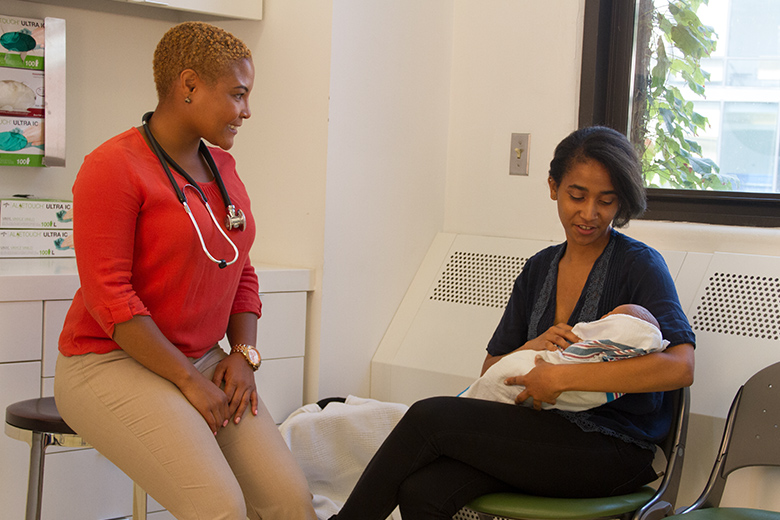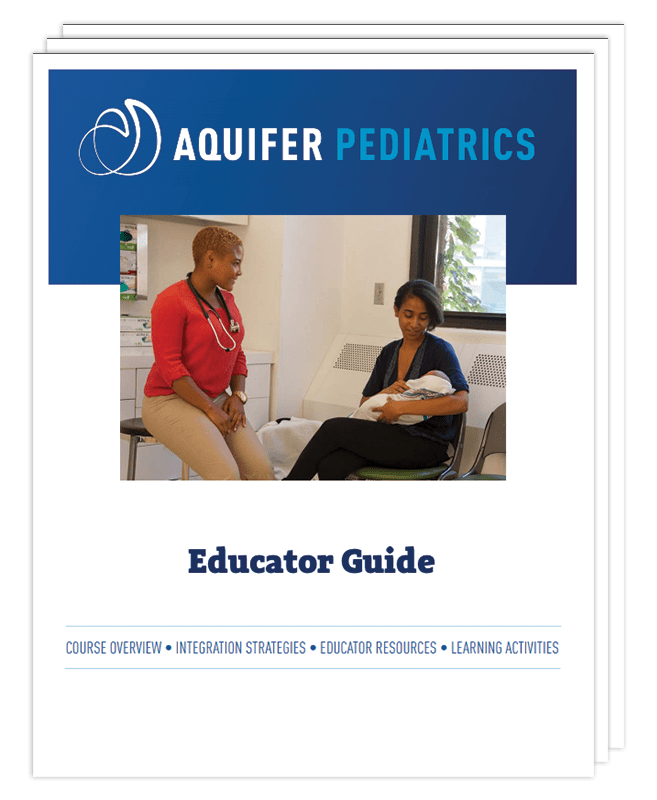

The 32 interactive virtual patient cases in Aquifer Pediatrics deliver on the learning objectives of the Council on Medical Student Education in Pediatrics (COMSEP) clerkship curriculum.
Overview
Aquifer Pediatrics helps students develop clinical reasoning skills critical to becoming successful practitioners. Our virtual cases provide key content correlated to COMSEP’s learning objectives—a proven path to success in developing clinical reasoning skills.
- Created for educators, by educators, to cover the full range of COMSEP’s curriculum
- Available for institutional subscription or for direct purchase by individual subscribers
- Access to Aquifer Calibrate: Transformative Assessments for Clinical Learning Mastery, our innovative system for formative assessment, available with your 2025-26 subscription
- Proven pedagogy that standardizes experiences—overcoming geography, seasonality, and accessibility
- Evidence-based, peer-reviewed, and continuously updated content
- Self-assessment questions emphasize key content and enable students to test their knowledge and skills
- A wealth of source material, tools, and full references in each case
- Course-specific student and educator resources, including active learning modules (TBL-style application exercises), interactive table of childhood developmental milestones, and a case analysis tool
- Delivered via the Aqueduct learning management system, which includes user management options, easy reporting on student progress and course usage, plus tools for creating custom courses to match a specific curriculum
With realistic case scenarios that demonstrate best practices, our course builds a bridge from content to practice for our students. Aquifer Pediatrics’ interactive virtual patient cases are based on the COMSEP curriculum. The cases ensure that students are exposed to all the various clinical scenarios, irrespective of location or time of year.
Aquifer Pediatrics can be used by third-year medical students, PA students, and Nurse Practitioner students as a complement to a clerkship or course on pediatrics.
Aquifer Calibrate, an innovative system for formative assessments, is available with your subscription to Aquifer Pediatrics. Calibrate combines the concepts of test-enhanced learning and distributed practice to facilitate efficient study planning and self-directed learning for students and identify at-risk students and curricular gaps for faculty.
Pediatrics 01: Newborn infant evaluation and care
Pediatrics 02: Infant well-child visits (2, 6, and 9 months)
Pediatrics 03: 3-year-old well-child visit
Pediatrics 04: 8-year-old well-child check
Pediatrics 05: 16-year-old health maintenance visit
Pediatrics 06: 16-year-old preparticipation evaluation
Pediatrics 07: 2-hour-old newborn with respiratory distress
Pediatrics 08: 6-day-old with jaundice
Pediatrics 09: 2-week-old with lethargy
Pediatrics 10: 6-month-old infant with a fever
Pediatrics 11: 4-year-old with fever and adenopathy
Pediatrics 12: 10-month-old with a cough
Pediatrics 13: 6-year-old with chronic cough
Pediatrics 14: 18-month-old with congestion
Pediatrics 15: Two siblings: 4-year-old and 8-week-old with vomiting
Pediatrics 16: 7-year-old with abdominal pain and vomiting
Pediatrics 17: 4-year-old refusing to walk
Pediatrics 18: 6-week-old with poor feeding
Pediatrics 19: 16-month-old with first seizure
Neurology 10 / Pediatrics 20: 7-year-old with headache
Pediatrics 21: 6-year-old with bruising
Pediatrics 22: 16-year-old with abdominal pain
Pediatrics 23: 15-year-old with lethargy and fever
Pediatrics 24: 2-year-old with altered mental status
Pediatrics 25: 2-month-old with apnea
Pediatrics 26: 9-week-old not gaining weight
Pediatrics 27: 8-year-old with abdominal pain
Pediatrics 28: 18-month-old with developmental delay
Pediatrics 29: Infant with hypotonia
Pediatrics 30: 2-year-old with sickle cell disease
Pediatrics 31: 5-year-old with puffy eyes
Pediatrics 32: A day in pediatric dermatology clinic
From Our Cases
Educator Resources
In addition to the 32 cases included with this course, the Aquifer Educators Consortium has developed Educator Resources to accompany this course, available to all subscribers. Resources include valuable teaching and learning tools to increase student engagement and maximize efficiency for faculty.
To access these tools, sign in to your Aquifer account and visit the Educator Resources section.

Educator Guide Available
Course Overview – Integration Strategies – Educator Resources – Learning Objectives
The Educator Guide—available to all subscribers—provides a quick reference guide for all cases, resources, and features included with Aquifer Pediatrics. The Educator Guide is ideal for educators who are getting started using Aquifer, or experienced users who want to be sure they are taking advantage of Aquifer’s extensive resources and tools. Learn more…
Active Learning Modules
These team-based learning exercises have been thoughtfully prepared with the aim of minimizing teacher preparation time and maximizing learner achievement. Learn more about the Pediatrics Active Learning Modules.
- Fever Module
- Immunizations Module
- Patient Safety Module
- Child Development Module
Case Analysis Tool
The toolkit contains a structured worksheet completed by the students as they work through the virtual patient case, designed to enhance the development of clinical reasoning skills. Each step mirrors the process through which clinicians gather and process information about a patient, leading up to the development of an initial evaluation and treatment plan. Answer keys are included for most cases. Learn more about the Case Analysis Tool.
Questions for Further Consideration
A series of questions available to promote further discussion of some of the important points in each case. These can be used to emphasize areas such as basic science, clinical reasoning, management, public health, and communications. The questions are formatted on an excel sheet to allow for easy sorting by case or topic
User Story Video
Learn how Aquifer Pediatrics can benefit medical students and faculty in your program:


